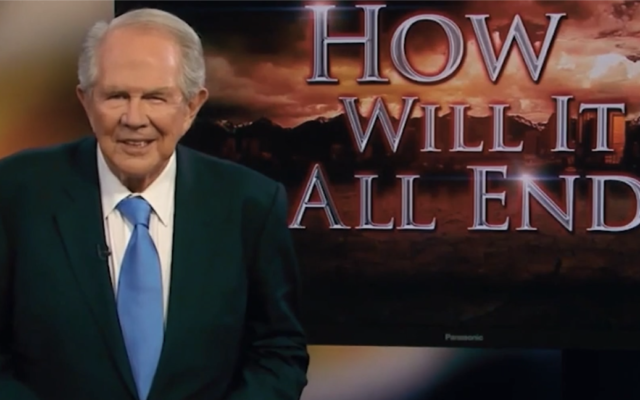Controversial Film Postponed After Editing Questions
UPDATED: April 9, 2021, the AJT learned of new information that the national film screening scheduled for March 29 as a Passover offering from PBS has not yet been shown.
Updated April 9, 2021 4:55 p.m.
Since publication of its article, the AJT learned of new information that the national film scheduled for March 29 was held up after a pro-Israel media watchdog pointed out that an important video clip of President Donald Trump was edited in such a way that it distorted the former president’s words.
CAMERA, the Committee for Accuracy in Middle East Reporting in America pointed out that the documentary had Trump saying that “the United States will recognize Israeli sovereignty over the territory that my vision provides to be part of the State of Israel, including the West Bank described so vividly in the Bible,” something CAMERA said Trump never actually said.
The quote was edited from a speech by Trump that joined the phrase, “The United States will recognize Israeli sovereignty over the territory that my vision provides to be part of the State of Israel,” to a quote from a different part of the speech in which Trump said, “the West Bank described so vividly in the Bible.” The documentary’s editor also added the word “including,” which was also not a part of Trump’s original speech.
After the complaint, the documentary’s producers made the correction, but PBS postposed the broadcast for a “complete editorial review” of the documentary.
The PBS review was applauded by film scholar David Resha, who teaches documentary film at the Oxford College campus of Emory University.
“Even though this seems like, all things considered a pretty minor issue, it was heartening for me to see PBS take it so seriously and actually go back and review the film, because it means that they’re taking their work and their integrity as seriously as possible.”
The action was a setback for a film that had support from a diverse group of financial backers, including Israel’s government film production fund and America’s International Documentary Association. The film had won praise from major newspapers and the popular film review web site Rotten Tomatoes gave it a perfect 100% critical rating.
The documentary’s veteran American distributor Richard Abramowitz declined comment about the PBS action.
……………………………………………………………………………………
Original Article: March 26, 2021 10:04 am

It’s no coincidence that the new documentary “’Til Kingdom Come” has a national screening on PBS March 29 during the third night of Passover and the beginning of Holy Week for America’s Christians.
The film, featured in the Atlanta Jewish Film Festival last month, looks at the passionate love affair between Israel and Evangelicals, and the potent intersection of money, religious belief and political power.
Its focus is the International Fellowship of Christians and Jews, a highly successful nonprofit that has raised over $1.4 billion for Israel since Conservative Rabbi Yechiel Eckstein, a former Anti-Defamation League staffer, started it in 1983.
In its latest yearly report, 2019, the organization raised over $130 million, which far outstrips such organizations that are much more familiar to our community here such as Hadassah, AIPAC (American Israel Public Affairs Committee) or FIDF (Friends of the Israel Defense Forces). Much of that money comes from Evangelical Christians that are estimated to make up as many as 100 million churchgoers in America.
As its title suggests, “Til Kingdom Come” examines the community’s beliefs against the backdrop of religious prophecy. Evangelicals believe in the biblical scenario that is laid out in the final book of the Christian Bible, the Book of Revelation, which describes a scenario for the End of Days. The event will take place, according to the film, only when the Jews of world have been gathered in Israel and given the choice to convert to Christianity or be killed.
Encouraging that ingathering and supporting Israel is a major tenet of evangelical faith in churches like the one in Binghamtown Baptist Church, which is in a corner of Appalachia in East Kentucky that economic progress has largely bypassed.
Despite that bleak economy, the film shows the community’s children filling buckets with coins brought from home for Israel and ultimately shows the presentation of a $25,000 check to the International Fellowship.
That kind of dedication, as the film points out, buys not only political influence in Israel, but reinforces the influence of Evangelicals at the highest levels of American government, particularly during the past four years.
That influence is what worries American producer Abie Troen and the film’s Israeli director Maya Zinshtein, who recorded over a hundred hours of video in the small Kentucky church and later in Washington, Los Angeles and on Israel’s West Bank.

“Being in the White House and seeing so many pastors is an image that Maya and I will take with ourselves, I think, for a long time to come,” Troen said. “And it’s important to remember, I think, especially now, that this is something which could happen again in four years and eight, looking forward to the next elections. The power that the evangelical church has on American politics is not something that’s going to disappear.”
Zinshtein, whose family immigrated to Israel from Russia when she was 10 years old, had never visited eastern Kentucky until she arrived to work on the film there.
She takes issue with the notion that all the money that’s raised by Evangelicals is in Israel’s best interest. While the film describes how it has swayed American politicians, supported the settler movement on the West Bank and financed a partisan political agenda, it may not be moving Israel toward a more secure future, according to Zinshtein.
“It is a very political question. And I think that the Christian and the Christian evangelicals are mainly supporting a very right-wing approach. …They won’t fight on our next war in Israel. And my brother here in Israel will, by the way. So I’m asking them why they think they have the right to push a certain agenda that is really based on the Bible?”
The film, which was nominated for the Jury Prize for Best Documentary at last month’s AJFF, has gotten considerable attention since it premiered at Israel Docaviv film festival in September.
Zinshtein has been interviewed at length in The New York Times, where the film got a favorable review. She and producer Troen also were featured in a podcast created by the Israel Policy Forum and the production is in an ambitious virtual national release with frequent stops at local Jewish film festivals around the country.
The documentary’s veteran American distributor Richard Abramowitz, who had three films in last month’s AJFF, has made a considerable financial bet that new film will capture a significant following of Christians and Jews.

“To think that the idea that you would take money from an impoverished community and use it to build settlements and displaced people and exacerbate a very delicate political dynamic concerns me. And so, the opportunity to make this film available to promote it and shine a light on that dynamic is something that interested us.”
For those who miss the Independent Lens late night screening on PBS, the film will have a limited run on Georgia Public Broadcasting’s website and through visual cinema viewing platforms.




comments